Ticket Sales Strategies: Boost Event Ticket Sales Effectively
Updated On: November 12, 2025 by Aaron Connolly
Core Ticket Sales Strategies
If you want to sell more event tickets, you need to actually understand your customers, choose the right platforms, and keep tabs on what’s working. Those three things, honestly, are what turn casual browsers into real buyers.
Understanding Your Audience
Before you even think about sales tactics, you’ve gotta know who’s actually buying your tickets. Expectations can be all over the place—a 20-year-old esports fan wants fast mobile checkout and fun social posts, but corporate folks? They’re looking for details and maybe an invoice.
Try polling past attendees on social media or by email. Ask them how they found you, what made them buy, and what almost stopped them. You’ll learn which marketing channels actually matter for your crowd.
Age plays a big role in how people buy tickets. Younger folks (18-30) often buy on impulse through social links and want everything to work on their phones. Older buyers usually research more and want to know exactly what they’re getting.
Build out buyer personas using your data. List what channels they like, how sensitive they are to price, and when they tend to buy. Students might need early-bird deals and payment plans, while professionals care about convenience and maybe a VIP option.
Let your survey results guide your moves. If 70% of your audience finds events through Instagram, put your budget there.
Choosing Effective Sales Channels
Pick ticket sales platforms based on where your audience hangs out, not just what’s easy for you. Each channel fits different habits and needs.
Main channels to consider:
- Event websites with mobile checkout
- Social media with direct buy links
- Third-party ticketing for wider reach
- Email blasts to your existing list
Social media is gold for younger buyers. Build hype with countdowns, behind-the-scenes clips, and maybe a few influencer shoutouts. Drop purchase links right in your posts and stories so nobody has to hunt for them.
QR codes are surprisingly effective for connecting offline and online. Stick them on posters, flyers, or at partner spots. People scan and buy—no need to remember long URLs.
Email still works, especially for folks who’ve bought before. Send them tailored recommendations and maybe some early access deals.
Offer a variety of payment options. Some people swear by PayPal, others want Apple Pay, and companies might need invoices.
Tracking Performance and Analytics
Keep an eye on your ticket sales numbers so you know what’s actually working. Without tracking, you’re just guessing.
Metrics you should watch:
| Metric | Purpose | Target |
|---|---|---|
| Conversion rate | Shows channel effectiveness | 2-5% for cold traffic |
| Cost per ticket sold | Measures marketing efficiency | Varies by event type |
| Customer acquisition source | Identifies best channels | Track top 3 sources |
| Average order value | Reveals pricing opportunities | Monitor trends |
Set up tracking codes for everything. You’ll see if Facebook ads, emails, or influencer posts lead to real sales or just extra clicks.
Watch how fast tickets sell over time. If things slow down, you might need a promo or a new message. If you sell out super fast, maybe you underpriced.
Look at customer lifetime value. If someone costs £20 to bring in but comes to three events, they’re more valuable than the £5 acquisition who never returns.
Check your analytics every week during sales. If Instagram ads aren’t converting, move some spend to email or try a new approach.
Strategic Pricing Techniques
Setting a ticket price and crossing your fingers isn’t enough. The smartest organisers use layered pricing to reach different groups and build excitement with time-limited deals that reward early birds.
Tiered Pricing Approach
Tiered pricing gives you multiple price points for all kinds of budgets. You get to offer basic access, VIP perks, and those big spenders? They get the full premium experience.
A typical tier setup:
- General admission: £25-40
- VIP: £75-100, includes perks
- Premium: £150+ with extras like meet-and-greets
VIP usually means better seating, swag, or backstage access. These perks make the higher price feel fair, and they also make the regular tickets look like a deal.
Three tiers is the sweet spot for most events. Too many options just confuse people. The middle tier tends to be the most popular.
Quick tip: Price the middle tier about 40-60% higher than your base ticket. That way, it stands out but doesn’t feel out of reach.
Time-Based Price Increases
Time-based pricing pushes people to buy early and rewards the ones who commit first. Prices go up at set points as your event gets closer.
A common schedule:
- Early bird: 2-3 months out (20-25% off)
- Regular: 1 month out
- Door price: Event day (10-15% more)
Early bird sales bring in cash fast and help you spot demand. If sales are slow, you can adjust your marketing before it’s too late.
Make each price jump big enough to get attention. A £15-20 increase usually works better than a small bump.
Heads up: Don’t let early bird last too long. Six weeks is usually enough to build urgency without making people feel rushed.
Value-Driven Pricing
Value-driven pricing focuses on what people get, not just what you need to make. Think about the real worth of your content and experience.
Check out what similar events charge. If others ask £50 for a basic ticket, but you offer better speakers or unique activities, you can justify a higher price.
Add up the value of what you’re giving. If there’s £30 in food, £20 in materials, and £40 in speaker value, a £75-90 ticket makes sense.
Ask past attendees what they’d pay for certain features—networking, premium seats, or exclusive content.
Know your audience’s budget. Corporate folks can usually pay more than students or indie devs.
Discounts and Incentives
A good mix of early discounts, group deals, and quick-fire offers can turn on-the-fence visitors into buyers. You’ll also get a nice boost in momentum for your event.
Early Bird Offers
Early bird pricing is a nice way to reward loyal fans for booking early. It also helps you cover costs way before the event.
Kick off with 20-30% off for the first month or two after tickets go live. You’ll get buzz right away, and sponsors love to see strong early sales.
Set a clear deadline—use countdown timers on your event page. Esports fans especially respond better to hard dates than vague “limited time” claims.
Try tiered early bird deals:
- Super Early Bird: 30% off (first 2 weeks)
- Early Bird: 20% off (weeks 3-6)
- Standard: Full price (6 weeks out)
Quick tip: Give early bird buyers extras like reserved seats or a meet-and-greet. That’s more value than just a discount.
Group Discounts
Gamers love to roll in packs. Group discounts tap into that and help you sell more tickets per transaction.
Set up group rates to encourage bigger bookings:
- 5-9 tickets: 10% off
- 10-19 tickets: 15% off
- 20+ tickets: 20% off
Put one person in charge of booking, but let everyone pay their share. University societies and gaming clans often struggle to collect money upfront.
Promote your group deals through:
- Uni gaming clubs
- Local gaming cafés
- Discord or Reddit groups
- Esports fan communities
Heads up: Set a minimum advance purchase window (2-4 weeks) so you don’t end up scrambling at the last minute.
Last-Minute Flash Sales
Flash sales are a lifesaver when ticket sales slow down. They’re especially handy a week or two before the event when you know how many seats you’ve got left.
Run 24-48 hour promos through email and socials. Use codes like “WEEKEND50” or “FLASH30” so you can track results.
Start with your existing audience—past buyers, email subscribers, and followers. They already trust you.
Good times for a flash sale:
- Midweek sales drop off
- A competitor event pops up
- You need to hit venue minimums
- Weather suddenly looks great (for outdoor events)
Don’t overdo flash sales, though. If you run them too often, people just wait for a discount.
Next: Try one discount strategy at your next event and see which brings in more revenue, not just more ticket sales.
Optimising the Event Website

Your event website is your main sales engine. If you make it smooth, mobile-friendly, and easy to buy, you’ll see way more conversions.
Creating a High-Converting Event Page
Your event page should answer the big questions right away. People need to know what’s happening, where, and why they should care.
Start with a headline that spells out the value. Put the date, location, and main speakers or acts front and center. Use bullet points to highlight the best parts instead of a big wall of text.
Add some great photos or videos to show what the vibe is like. If it’s a repeat event, use past pics. New event? Use shots of the venue or your main guests.
Social proof matters. Show off testimonials from attendees, speakers, or industry folks near the ticket section.
Make sure ticket info is visible without scrolling. Show your price tiers, availability, and any deals right at the top. Use bold, contrasting colours for your pricing boxes.
Mobile optimisation is non-negotiable. Test your page on different phones to make sure buttons are easy to tap and text is readable.
Clear Call-to-Action Buttons
Your call-to-action buttons need to pop. They should be obvious and use action words.
Pick colours that really stand out—orange or red usually works, but test with your crowd.
Be specific and urgent with your button text. “Get Your Tickets Now” or “Reserve Your Spot Today” beats a generic “Click Here.” If it helps, mention the price right on the button.
Scatter a few CTA buttons throughout the page. Put one at the top, one after your pitch, and one at the bottom. That way, you catch people wherever they are.
Make buttons big enough for mobile—at least 44 pixels tall is a good rule.
Try out different button styles and wording. Even small tweaks can boost sales.
Integrating Countdown Timers
Countdown timers add real urgency and push people to act. They’re perfect for early bird deals or limited-time offers.
Put timers close to your ticket buttons. Show exactly how much time is left until the price jumps or sales close. Make the numbers big and easy to spot.
Go for dynamic timers. Live countdowns with ticking seconds work better than just listing a date.
You can use more than one timer if you’ve got multiple offers. Maybe one for early bird, another for general sales.
Match your timer’s look to your brand. A business conference might want a clean, simple timer, while a festival can have something more colourful.
Don’t overdo it, though. Too many timers can feel fake. Save them for real deadlines—like when prices change or you’re close to selling out.
Add a note explaining what happens when time runs out. Something like, “Price jumps to £150 after early bird ends” makes it clear.
Online Ticket Sales Experience
The way people buy tickets online can make or break your sales. If your site works well on mobile, checkout is simple, and payments are secure, people are much less likely to bail before buying.
Mobile Optimisation
Most people buy event tickets on their phones these days. Over 60% of online ticket sales happen on mobile devices, so your site really needs to work well on small screens.
Make your ticket pages load fast on phones. Slow sites push buyers away. Keep forms short and simple—nobody wants to fill out endless fields on a tiny screen.
Use big, easy-to-tap buttons. Small links just frustrate mobile users. Design your ticket selection for thumb navigation. People should be able to pick seats and ticket types without zooming in or squinting.
Test your mobile site regularly. Check how it looks on different phones. What works on an iPhone might look off on an Android.
Quick mobile checklist:
- Page loads in under 3 seconds
- Buttons are thumb-sized
- Text is readable without zooming
- Forms have large input fields
User-Friendly Checkout
A messy checkout process kills ticket sales fast. Keep the buying process to three steps or fewer. Every extra step loses about 10% of buyers—yikes.
Show buyers exactly where they are in the process. Use progress bars or numbered steps. This helps people feel like they’re in control.
Don’t force people to create accounts before buying. Let them check out as guests. You can always ask them to sign up later.
Display all costs upfront. Hidden fees at the end just make people mad and lead to bad reviews. Show ticket prices, booking fees, and delivery charges right away.
Write error messages that actually help. Instead of “Invalid input,” try “Please enter a valid postcode.” Clear messages help buyers fix issues quickly.
Secure Payment Processing
People worry about online payment security, and who can blame them? Show security badges and SSL certificates on your payment pages. These trust signals help reduce checkout abandonment.
Offer multiple payment methods. Credit cards, debit cards, PayPal, and digital wallets give buyers choices. Some people just won’t buy unless their favorite payment method is there.
Go with established payment processors like Stripe or Square. These companies handle security compliance for you. They also offer buyer protection, which boosts confidence.
Send confirmation emails right after purchase. Include all ticket details and clear instructions for event entry. Follow up with reminder emails as the event date gets closer.
Store customer payment information securely for future purchases. This makes repeat buying easier, as long as you keep security tight.
Social Media Marketing Tactics
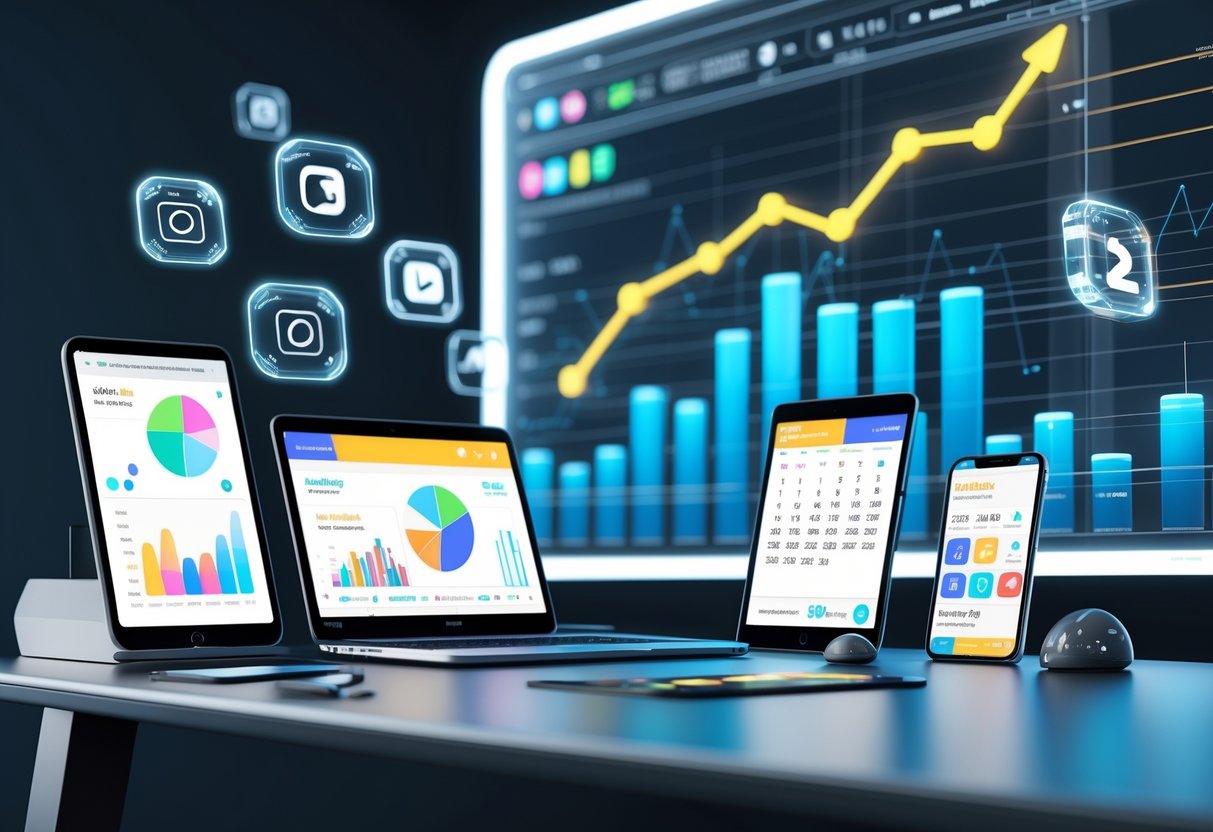
Social media platforms offer huge potential for selling event tickets through targeted content and strategic partnerships. The trick is to create genuine engagement instead of just spamming sales posts, while using paid ads to reach new people.
Building Event Buzz
You need to create real excitement on social media with consistent, valuable content that makes people want to show up. Forget basic promo posts—focus on storytelling.
Share behind-the-scenes content often. Show your speakers prepping, the venue coming together, or your team planning. These little glimpses help your audience feel connected.
Run interactive campaigns that spark conversations. Try polls about workshop topics, Q&As with speakers, or countdown posts to build anticipation.
Encourage user-generated content from past attendees. Repost their photos and testimonials (with permission). Social proof from real people always beats branded content.
Create shareable moments with contests and giveaways. Offer free tickets for sharing posts or tagging friends. Keep entry rules simple—nobody likes complicated contests.
Use platform-specific features smartly:
- Instagram Stories for quick polls and updates
- LinkedIn articles for professional events
- Twitter threads for more detailed info
- Facebook events for group discussions
Watch your engagement rates and tweak your content based on what actually resonates.
Teaming Up with Influencers
The right social media influencers can expand your reach in a big way. Go for relevance over just follower count—it really pays off.
Find micro-influencers in your industry or local area. They usually get higher engagement and don’t charge a fortune.
Start with your speakers and performers. They already care about promoting your event and have audiences who trust them.
Offer more than just payment. Give them exclusive access, VIP perks, or networking opportunities they’ll actually want.
Create custom promo materials for each influencer. Graphics with their photo or a quote work way better than generic stuff.
Track referral codes to see which partnerships drive real ticket sales, not just likes.
Build long-term relationships instead of one-off deals. Ongoing collaborations feel more authentic and deliver better results.
Paid Advertising Campaigns
Smart paid social ads can target the right people and drive ticket sales if you do it right.
Use retargeting campaigns to reach folks who visited your event page but didn’t buy. These warm leads convert way better than cold traffic.
Create lookalike audiences based on past buyers or email subscribers. Platforms will find people with similar interests.
Try different ad formats:
- Video ads grab attention (21% of viewers convert after watching a 60-second video)
- Carousel ads to show off multiple speakers or activities
- Lead generation ads to collect email addresses
Set up conversion tracking properly. Install Facebook Pixel or similar tools to track real ticket purchases, not just clicks.
Split your budget wisely:
- 40% for proven audiences (retargeting, email lists)
- 35% for lookalikes
- 25% for testing new interests
Run ads on several platforms but tweak your content for each one. LinkedIn works for pro events, Instagram is better for lifestyle and entertainment.
Keep an eye on your cost per acquisition and pause ads that aren’t working to get the most out of your budget.
Leveraging Email Marketing
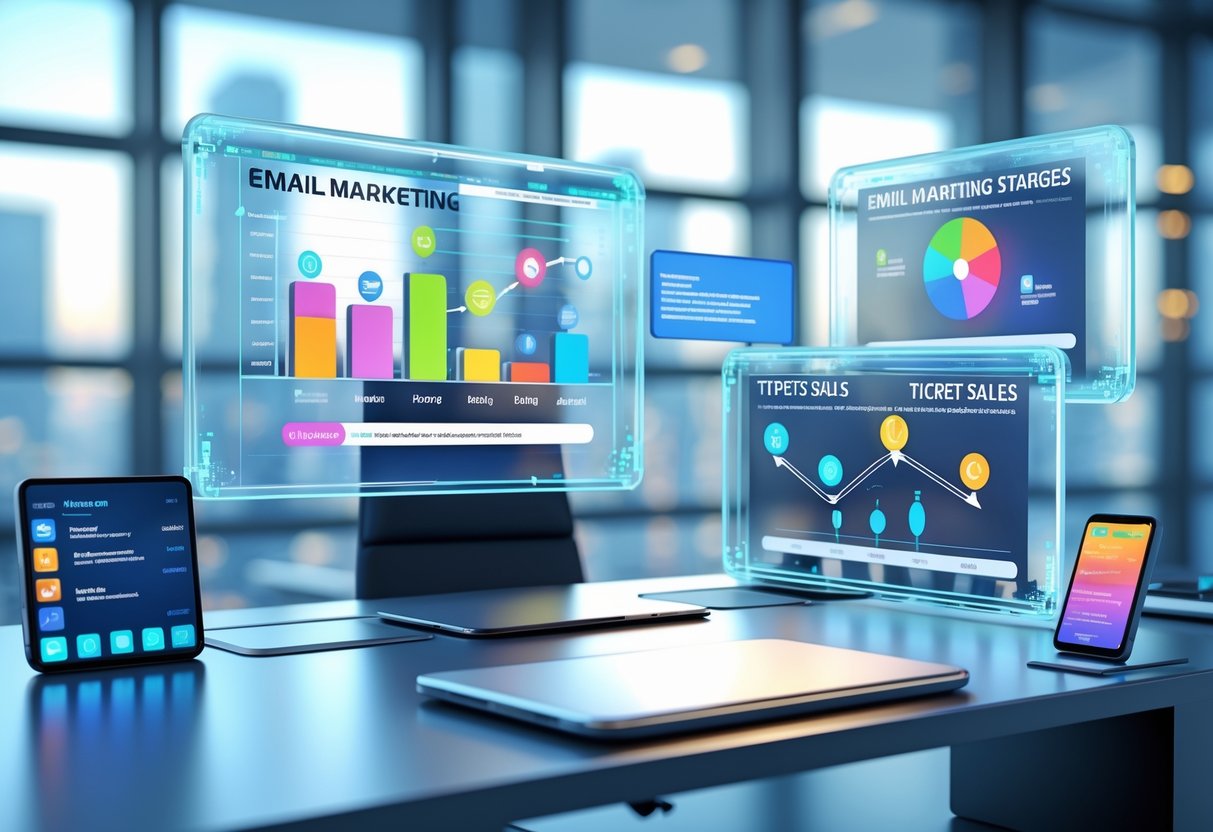
Email marketing delivers an average ROI of £35 for every pound spent. It’s easily one of the most cost-effective ways to sell tickets. Smart segmentation and automated campaigns can turn your subscriber list into steady revenue.
Crafting Compelling Email Campaigns
Your subject line decides if people even open your email. Use action words and a bit of urgency, but don’t go overboard. “Three days left: Early bird prices end Monday” beats “Don’t miss our event!” every time.
Keep your emails scannable with short paragraphs and bullet points. Make sure your calls-to-action stand out—use bright buttons or bold text for “Buy Tickets Now” links.
Quick win: Test two subject lines by sending to small parts of your list first. Blast the winning version to everyone else.
Add social proof to your emails. Share photos from past events or a quote from a happy attendee. This builds trust and gives people a taste of what they’re missing.
Send emails at smart times. Tuesday through Thursday, between 10 AM and 2 PM, usually get the best open rates. Mondays and Fridays? Not so much.
Segmentation for Targeted Messaging
Not every subscriber wants the same thing, so don’t send them all the same emails. Split your list by past attendance, purchase history, and engagement.
First-timers need different info than returning fans. New subscribers should get a welcome series that explains your event’s value. Loyal customers deserve early access or exclusive offers.
Use location-based segmentation for local events. Send different messages to people nearby versus those who’d need to travel.
Segment by ticket preferences, too. Some always buy VIP, others stick to general admission. Tailor your offers to match.
| Segment Type | Message Focus | Example Offer |
|---|---|---|
| New subscribers | Event introduction | 15% off first ticket |
| Past attendees | Exclusive access | Early bird pricing |
| High spenders | Premium experiences | VIP upgrade discount |
| Local audience | Convenience factors | Partner parking deals |
Automation and Follow-Ups
Set up automated email sequences that trigger when people take action. When someone joins your list, send them a welcome email with your next event details right away.
Create abandoned cart emails for people who start buying tickets but don’t finish. Send a follow-up within an hour, then another after 24 hours.
Heads up: Don’t spam people every day. Space out your messages or they’ll unsubscribe fast.
Schedule reminder emails at key times: announce early bird pricing, remind when it’s ending, and build urgency as your event gets closer.
Use behavioral triggers to personalize follow-ups. If someone clicks on VIP ticket info but doesn’t buy, send them content about the perks.
Track your email performance—open rates, clicks, conversions. Most platforms show you these stats automatically.
Referral and Loyalty Programmes
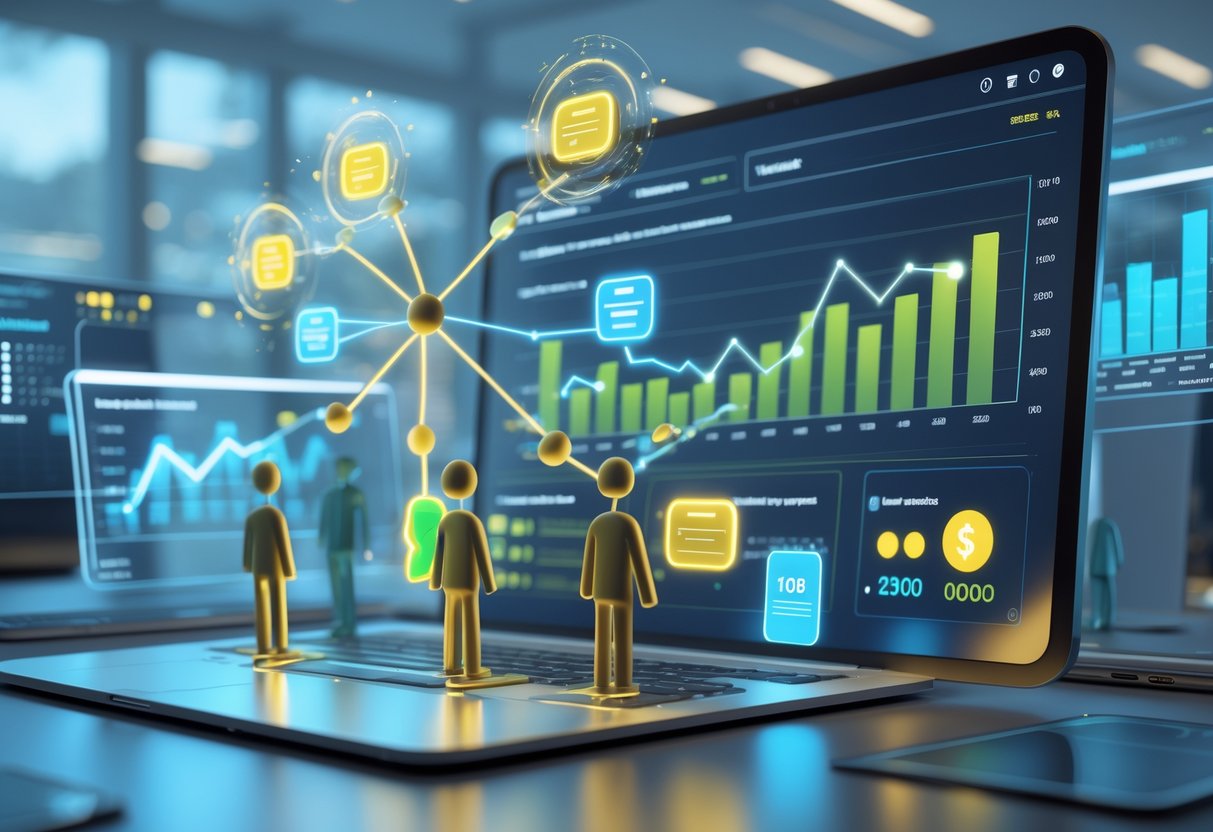
Referral programmes turn your ticket buyers into your best salespeople. Smart loyalty rewards keep fans coming back, and exclusive perks create urgency for future events.
Setting Up a Referral Programme
Start with a “high threshold, high reward” setup. Set your reward at £15 or more, but only after 3-5 successful referrals.
This balance motivates sharing without breaking the bank. Events with referral programmes usually see acquisition costs drop to about £1.40 per ticket—way cheaper than ads.
Key steps to launch:
- Give each ticket buyer a unique referral code
- Promote the programme on your confirmation page
- Send follow-up emails reminding buyers to share their codes
- Add a referral page to your event website
The confirmation screen works best for promotion. Buyers just bought tickets, so inviting friends is fresh on their minds.
Track your programme closely. Many people share codes but don’t hit the threshold, so your costs stay lower than the potential rewards.
Rewarding Loyal Buyers
Loyalty programmes focus on repeat behaviour, not just sharing.
Effective loyalty rewards:
- Early bird access to future ticket sales
- Tiered pricing with discounts for returning customers
- Exclusive merchandise or VIP experiences
- Points systems that add up over multiple events
Presales work especially well for esports events. Hardcore fans value priority access even more than discounts.
Consider segmenting your loyalty programme. Casual attendees might like percentage discounts, while super fans want backstage passes or meet-and-greets.
Implementation tips:
- Use your ticketing platform’s database to spot repeat buyers
- Set up automated emails for different loyalty tiers
- Offer perks that can’t be bought anywhere else
Make your loyal customers feel genuinely appreciated, not just targeted.
Creating Scarcity and Urgency

If people feel like they might miss out, they buy tickets faster. Real-time availability and time-limited offers create powerful psychological pressure that turns interest into sales.
Displaying Ticket Availability
Show the exact number of tickets left to create real scarcity. Put messages like “Only 12 tickets remaining” front and center on your booking page.
Update these numbers in real time as sales happen. Watching availability drop from 15 to 8 tickets while browsing really builds urgency.
Use colour psychology to highlight scarcity. Red warnings for low stock stand out more than plain grey. Place these alerts near the buy button for max impact.
Visual urgency tricks:
- Progress bars showing sold vs. remaining seats
- “Almost sold out” banners when less than 20% are left
- Live ticker updates of recent purchases
Be honest about scarcity, though. If you have 500 tickets, don’t claim only 5 are left. Real transparency about limited capacity builds trust and still creates urgency.
Implementing Limited-Time Promotions
Flash sales push people to act fast by offering real savings for a short window. We usually recommend a 24-48 hour window. Any longer and it starts to look a bit desperate.
A countdown timer ramps up visual urgency for these deals. Put those timers front and center, showing hours and minutes left. That psychological nudge often convinces hesitant buyers to just go for it.
Effective time-limited strategies:
- Early bird pricing (first 48 hours only)
- Weekend flash discounts (Friday-Sunday)
- Last-minute deals (final week before event)
Blast these offers out everywhere at once. Fire off urgent emails, post countdowns on social, and swap out your website banners.
Make sure the discount actually feels worth it. A tiny 5% off rarely gets anyone excited, but 25% off? That gets people moving. Spell out exactly what buyers lose if they wait—not just the discount, but maybe missing out entirely.
High Ticket Sales Approaches

High ticket sales flip the script from quick deals to building deep relationships. You need to design personalised experiences that really earn premium pricing and handle buyer expectations through longer sales cycles.
Personalised Customer Journeys
Forget one-size-fits-all. We map out individual customer journeys, focusing on what each prospect actually cares about.
Research-Driven Customisation Before we even talk, we dig into prospects’ backgrounds using social media, company reports, and industry news. That research shapes every conversation.
Creating buyer personas means going deeper than just age or job title. We look at how they make decisions, who signs off on budgets, and what really motivates them to buy.
Tailored Communication Strategies Different stakeholders want different things. Technical buyers want specs, while finance folks care about ROI.
We pick communication channels based on what works best for each person. Some execs want long email proposals, others just want a short video or a face-to-face chat.
Exclusive Perks and Access Big spenders expect special treatment. We offer early access to features, dedicated support, or invites to exclusive events.
These perks make people feel valued even before they buy. That emotional connection makes them more likely to invest.
Building Trust and Value
When you’re asking someone to spend thousands, trust is everything. We show credibility at every step and make our value crystal clear.
Social Proof and Credibility Markers We highlight testimonials from similar big-ticket clients, focusing on real outcomes and numbers. Case studies get straight to the measurable results.
We also show off industry certifications, awards, and partnerships—these third-party validations matter. You’ll see them in our sales decks and marketing materials.
Consultative Selling Approach We don’t just push products. Instead, we act as advisors, asking smart questions about business challenges and offering helpful solutions—even if it doesn’t directly benefit us right away.
We share industry insights and trends, helping prospects make smart decisions.
Value Demonstration Big sales mean you have to explain value clearly. We break down pricing so prospects see exactly what they’re getting.
ROI calculations stay realistic. Overpromising kills trust. If anything, we underpromise—so we can overdeliver.
Managing Buyer Expectations
High ticket buyers expect a lot, which makes sense given the investment. We set clear timelines and make sure everyone knows exactly what’s included.
Clear Communication of Deliverables We write down every part of our service, from timelines to milestones and success metrics. This keeps things clear and avoids nasty surprises.
Contracts and service level agreements protect both sides. We walk clients through them, not just hand them over.
Timeline and Process Management Big deals often take longer to roll out. We build detailed project plans with clear milestones and realistic deadlines.
Regular updates keep clients in the loop. Weekly or monthly check-ins work better than going silent for weeks.
Ongoing Support Structures If you’re charging premium prices, you need to back it up with premium support. We set up dedicated contact channels and promise quick response times.
Training and onboarding help clients get the most out of their investment. This cuts down on buyer’s remorse and increases the odds they’ll come back or refer others.
Maximising Group and Corporate Sales
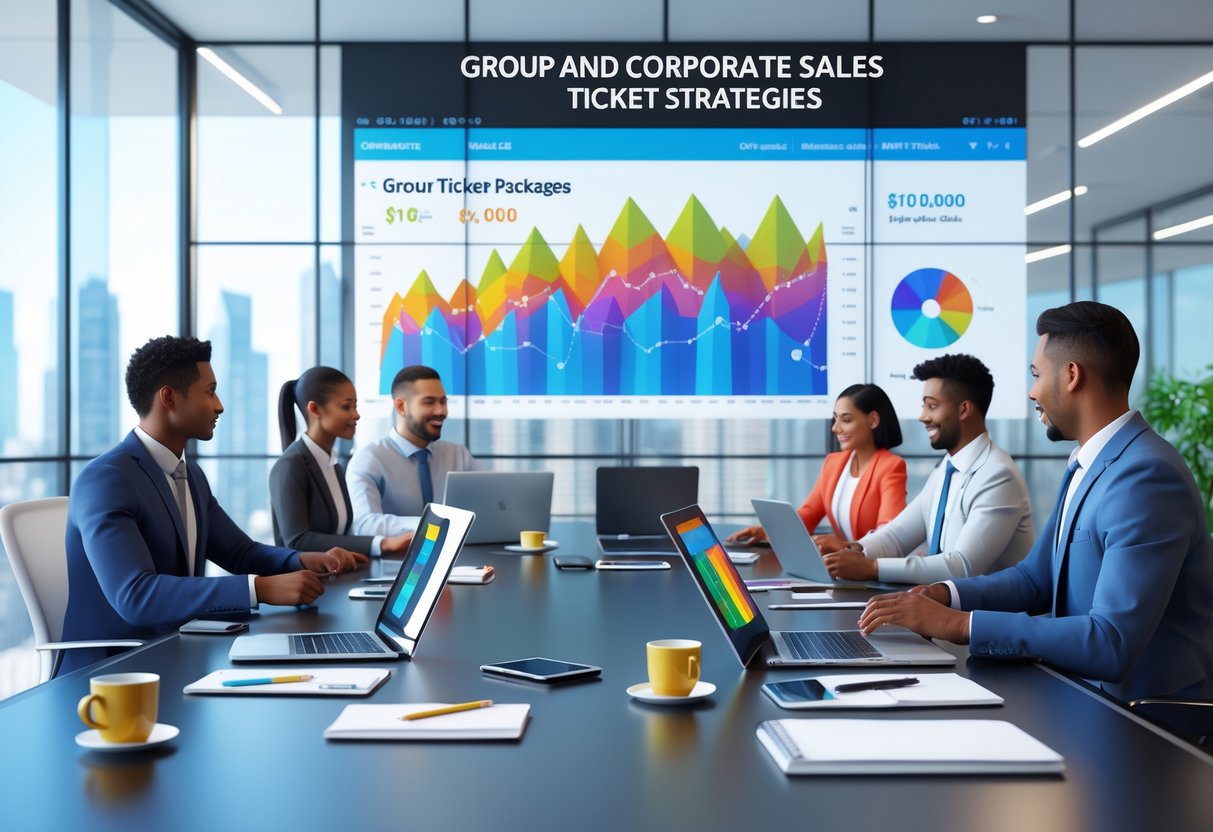
Group and corporate sales are a great way to fill seats in bulk and build real business relationships. Corporate packages deliver premium experiences for business clients. Seminars and business events pull in pros looking for networking opportunities.
Corporate Packages
Corporate packages turn regular events into something special for business groups. Usually, these include group discounts of 15-25% for bookings over 20 tickets.
The trick is to bundle things businesses actually want. Offer reserved seating, private hospitality areas, and networking spaces before the event.
Premium add-ons work well:
- Private reception areas with catering
- Meet-and-greets with players or speakers
- Branded gifts for attendees
- Flexible payment terms (like 30-day invoicing)
Companies book these for client entertainment or team rewards. The average booking lands somewhere between £2,000 and £8,000, depending on the event.
A lot of corporate clients come back for multiple events. Building relationships with HR and event planners pays off in repeat business.
Seminars and Business Events
Business seminars attract professionals who want to learn and network. These work best on weekday afternoons or evenings.
Effective seminar formats include:
- Expert panels
- Skills workshops
- Networking events
- Educational conferences
Group discounts for seminars usually start at 10-15% for teams of five or more. Companies often send whole departments.
Partnering with local business associations helps. They’ll promote your events to their members if you offer discounts or share revenue.
Professional attendees expect real networking. Add structured networking breaks, contact exchange tools, and follow-up resources to give value beyond the main event.
Frequently Asked Questions
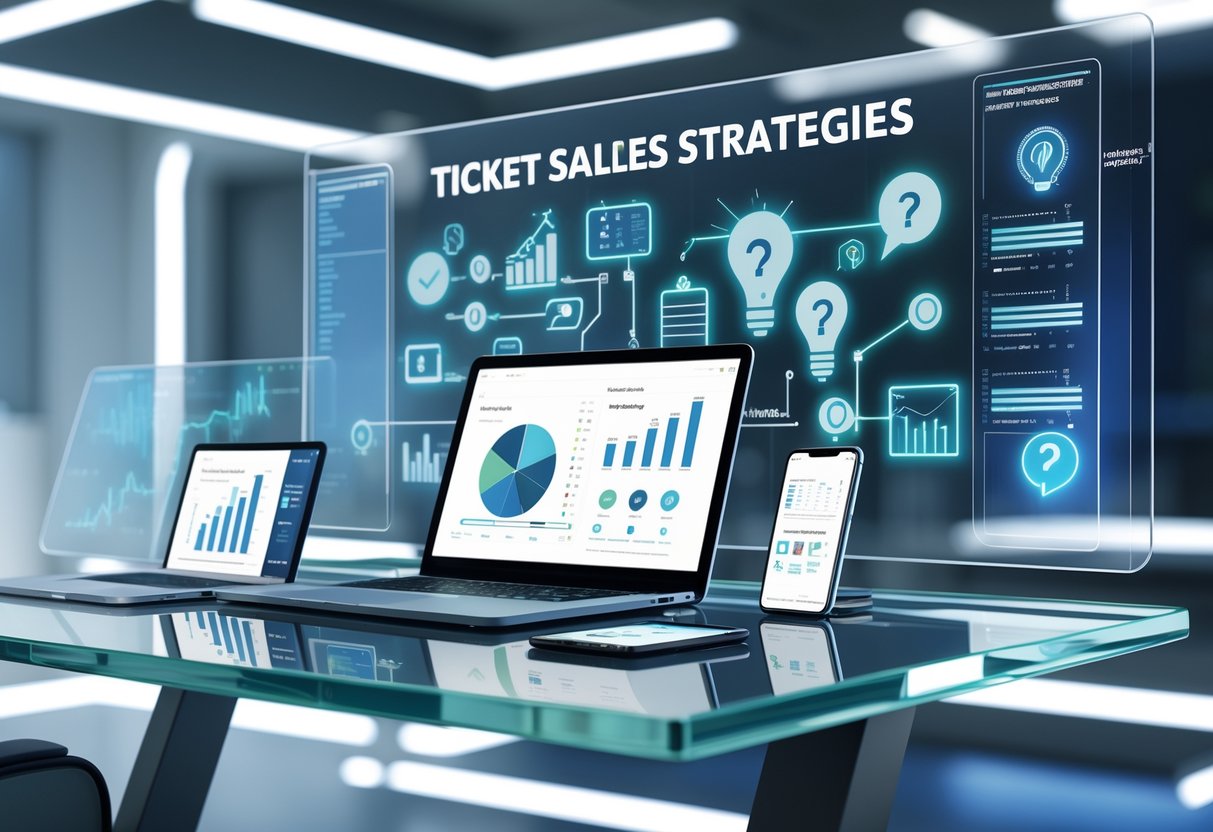
Timing, pricing strategies, and hitting the right audience across channels make ticket sales work. Smart promotion and picking the right platforms can boost your revenue while keeping costs in check.
What are the most effective methods for selling event tickets quickly?
Early bird pricing creates urgency—offering 20-30% off for the first 100 tickets works wonders.
Multi-channel marketing gets quick results. Hit email, social ads, and partner networks all at once.
Limited-time deals fuel FOMO. Use clear deadlines and countdown timers on your ticket pages.
Mobile checkout should be smooth. Most people buy tickets on their phones, so make it one-click if you can.
Can you suggest some creative ideas for ticket sales promotions?
Bundle tickets with perks like meet-and-greets or VIP access. It boosts value without much extra cost.
Group discounts drive bulk sales. Offer team packs or “bring a friend” deals to lower per-ticket prices.
Social media contests get the word out. Give away tickets for shares, tags, or user-generated content.
Flash sales keep things exciting. Drop surprise 24-hour discounts for your email list or followers.
What are some cost-effective strategies for selling tickets online?
Team up with speakers and sponsors for cross-promotion. It widens your reach without extra ad spend.
Email marketing gives the best ROI. Segment your list and send targeted messages based on interests and past actions.
Organic social media is free—just your time. Share behind-the-scenes posts and speaker previews.
Affiliate programs turn others into your sales team. Pay partners a commission for bringing in buyers.
How can one utilise social media, like Facebook, to boost ticket sales for an event?
Set up event pages on Facebook to keep info and updates in one place. Encourage people to mark themselves as “going”—it’s social proof.
Use Facebook ads to target the right audience. Filter by interests, location, and job title.
Share video testimonials from past events. These build trust and show what people can expect.
Partner with industry influencers for authentic shout-outs. Their word means more than a standard ad.
Are there particular platforms that are more affordable for event organisers to sell their tickets through?
Eventbrite charges 2-5% per ticket plus payment fees. It’s easy to use, but fees add up with big events.
Selling on your own website skips platform fees, but you’ll need to set up payment processing. This works best if you already have an audience.
Social platforms now offer built-in ticketing. Facebook and Instagram tickets fit right into your promos.
Bulk corporate sales can skip platform fees altogether. Direct invoicing saves a lot on big orders.
What tactics should be employed when aiming to sell high-value tickets?
When you’re selling expensive tickets, building real relationships is key. Pick up the phone or set up a coffee meeting—don’t just blast out mass emails and expect results.
Spell out exactly what people get for the higher price. Be specific about the benefits, the networking, and any exclusive perks you’re offering.
Try offering payment plans. Breaking up big costs into monthly instalments—especially for anything over £500—can make a huge difference for buyers.
Show off your social proof. Put testimonials, success stories, and logos from past high-profile attendees front and center. It really helps nudge people off the fence.

